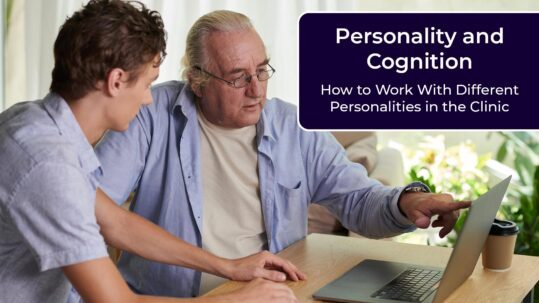Anxiety and Cognition: Implications for Clinical Practice
Anxiety is a universal human experience. Whether you’re running late or anticipating a big event, anxiety can pop up from time to time. However, anxiety can be disruptive when chronic or overwhelming, making it hard to participate in daily life activities. Understanding how anxiety impacts cognition may aid in providing better care and support when working with people with cognitive challenges.

How Anxiety Impacts Cognition
Anxiety is more than just an ‘off’ feeling—it is a psychophysiological state that directly affects cognitive processes. When we are anxious, our brain often prioritizes threat detection over higher-order thinking. This shift in focus can influence several domains of cognition:
- Attention and Focus: Anxious individuals often report concentration difficulties. Anxiety heightens activity in the amygdala, leading to increased fear and emotional responses while decreasing attentional control networks. This makes it harder to filter out distractions and stay on task.
- Working Memory: The anxious mind is often busy with racing or intrusive thoughts. This mental clutter takes up space in working memory, reducing the capacity for storing and manipulating information in real-time. This may be crucial for tasks like following directions, problem-solving, or everyday conversations.
- Processing Speed: When urgency or fear are in the front seat, anxiety can slow down cognitive processing or lead to rushed, error-prone decisions.
Executive Functioning: Planning, organizing, and decision-making may be compromised when anxiety is present. This may especially hold true for individuals with generalized anxiety disorder (GAD), panic disorder, or PTSD.
Implications for Intervention
Interdisciplinary collaboration is key when addressing anxiety-related cognitive impairments. Here are a few evidence-informed strategies clinicians might consider:
- Psychoeducation: Teaching clients about how anxiety impacts their thinking can normalize their experience and improve self-awareness.
- Environmental Modifications: Crafting an environment for success may also help, such as a relaxing space designed by the individual. This could include dimmed lighting or preferred music.
- Adaptive Supports: Reducing cognitive load through visual schedules, written cues, or structured routines can support attention and memory.
- Cognitive-Behavioral Techniques: Reframing negative thought patterns and teaching mindfulness can help regulate the cognitive disruptions caused by anxiety.
- Graded Exposure: Gradually increasing task complexity or exposure to anxiety-provoking stimuli can help rebuild confidence and cognitive resilience.
- Use of Cognitive Training Tools: Targeted cognitive rehabilitation programs may help strengthen attention, memory, and executive functioning when anxiety has contributed to cognitive decline or inefficiency. This is where HappyNeuron Pro may come in handy!
How HappyNeuron Pro Can Help
At HappyNeuron, we get how closely intertwined emotions and cognitive performance can be—especially when anxiety takes over. Our online platform offers a variety of scientifically designed cognitive exercises that target key domains like attention, working memory, and executive function. Whether working with clients in-person, remotely, or using our home-program “workouts” feature, our tools can assist in molding a more structured, flexible, and meaningful practice that meets each person where they are. We provide a helping hand to support clients in building not just cognitive skills, but cognitive confidence too!
Final Thoughts
Anxiety and cognition are closely linked, and having an increased understanding of how one impacts the other is important for serving clients from a variety of backgrounds and lived experiences.
Anxiety can cloud thinking, make simple everyday tasks feel overwhelming, and get in the way of true progress. Tuning in to a client’s unique relationship with anxious thoughts, feelings, and experiences deepens clinical reasoning and further facilitates holistic care. Keeping this in mind, professionals can better identify barriers, tailor interventions, and empower clients to regain control over their daily lives and cognitive health. By leading with compassion and addressing big emotions– we validate the full human experience.
References:
https://www.psychologytoday.com/us/blog/anxiety-fear-and-hate/201902/how-anxiety-impacts-the-way-we-perceive-and-think
Robinson OJ, Vytal K, Cornwell BR, Grillon C. The impact of anxiety upon cognition: perspectives from human threat of shock studies. Front Hum Neurosci. 2013 May 17;7:203. doi: 10.3389/fnhum.2013.00203. PMID: 23730279; PMCID: PMC3656338.
Clarke, P., & MacLeod, C. (2013). The impact of anxiety on cognitive task performance. In P. A. Arnett (Ed.), Secondary influences on neuropsychological test performance: Research findings and practical applications (pp. 93–116). Oxford University Press.









